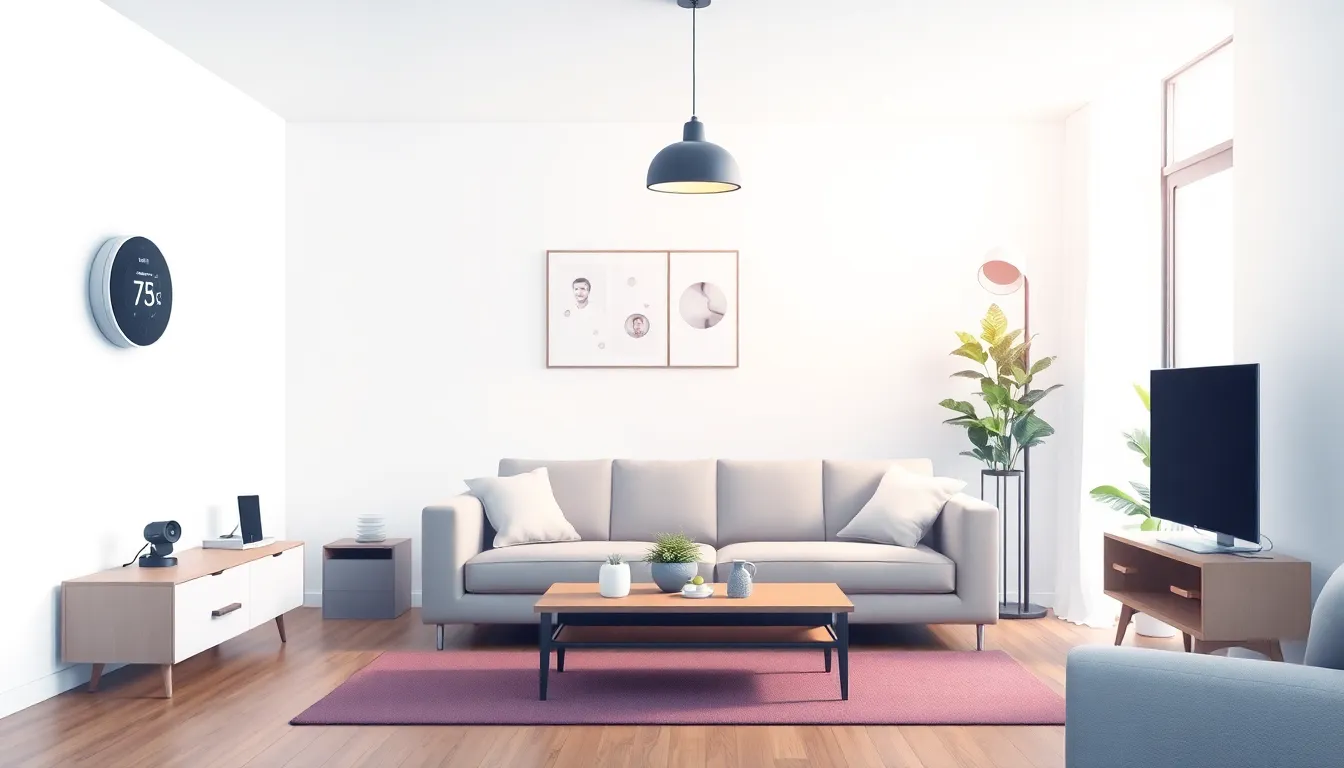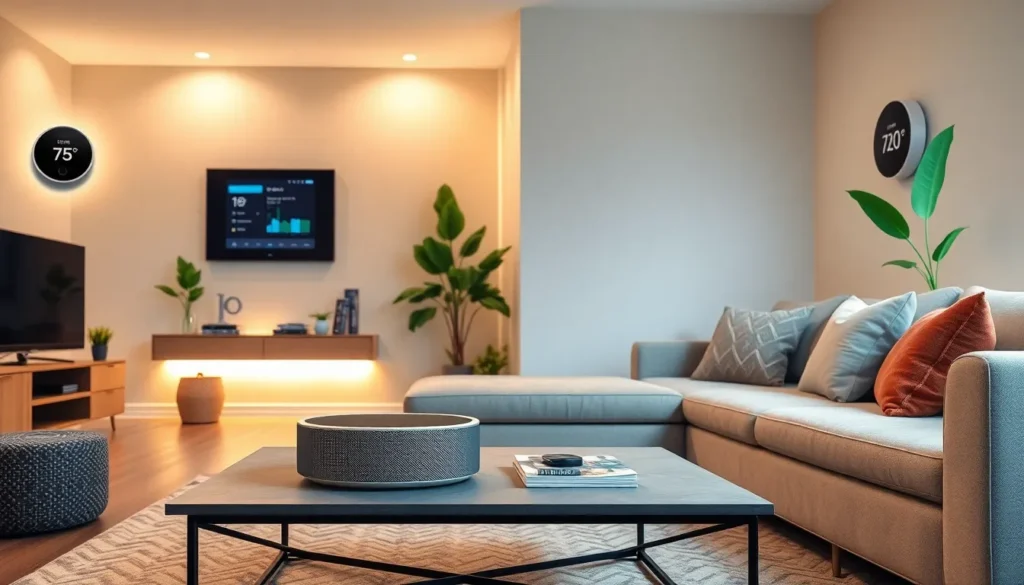Table of Contents
ToggleHome automation isn’t just for tech enthusiasts anymore; it’s become a game-changer for everyday living. Imagine controlling your lights, thermostat, and even your coffee maker with a simple voice command. It’s like having a personal assistant who never needs a coffee break! As the industry evolves, the latest innovations are making smart homes more accessible, affordable, and downright fun.
In this fast-paced world of gadgets and gizmos, staying updated on home automation news is essential. From cutting-edge devices that can recognize your mood to systems that can save you money on energy bills, the future is here, and it’s looking bright. So buckle up and get ready to dive into the latest trends, tips, and technologies that’ll transform your home into a smart sanctuary. Who knew living in the future could be this entertaining?
Latest Trends in Home Automation News
Home automation technology continues to evolve, providing new solutions that enhance daily life. Keeping up with the latest trends is crucial for homeowners looking to optimize their living spaces.
Smart Home Devices
Smart home devices dominate the market, integrating various functionalities seamlessly. Smart speakers, like Amazon Echo and Google Nest, facilitate voice control for multiple connected devices. Smart thermostats adjust heating and cooling based on individual preferences, maximizing comfort and efficiency. Security systems now include smart cameras with facial recognition, providing real-time alerts and monitoring. Additionally, smart lighting systems adapt to user routines, enhancing ambiance while saving energy. These innovations contribute to a more cohesive and responsive home environment.
Energy Management Solutions
Energy management solutions gain attention as homeowners seek sustainability. Smart energy meters track consumption patterns, empowering users to make informed decisions. Solar energy systems integrate with home automation for optimized energy usage and lower utility costs. Home automation platforms allow for scheduling appliances to run during off-peak hours, reducing expenses. Smart blinds regulate natural light, contributing to temperature control. These solutions collectively foster energy efficiency, further promoting eco-friendly practices in residential spaces.
Industry Developments

Home automation continues to advance rapidly, showcasing emerging technologies and strategic moves within the industry. Recent trends highlight significant acquisitions and the rise of innovative startups that drive the market forward.
Major Acquisitions
Tech giants increasingly focus on home automation through acquisitions. For instance, Google acquired Nest Labs in 2014, strengthening its position in smart thermostats and security cameras. Amazon’s purchase of Blink in 2017 expanded its smart home security offerings. In 2021, Apple’s acquisition of the smart home startup, Voysis, marked a shift toward enhanced voice recognition in home automation products. These acquisitions not only enhance product portfolios but also signal a commitment to integrating diverse technologies.
Innovative Startups
Startups play a crucial role in shaping the future of home automation. One notable example is Wyze, known for affordable smart home devices catering to budget-conscious consumers. Another promising startup, Tado, focuses on smart climate control solutions that optimize energy use for residential settings. Additionally, Eve Systems emphasizes privacy, developing products that function without cloud connectivity. These startups drive innovation, bringing fresh ideas and competitive pricing, ultimately benefiting consumers by expanding product choices and improving user experiences.
Consumer Insights
Consumer interest in home automation has surged as technology advances. Many individuals prioritize convenience and security in their daily lives, making smart home products increasingly popular.
Popular Products
Smart speakers dominate the market, with devices from Amazon and Google serving as central hubs for home automation. Thermostats equipped with learning capabilities optimize energy use and can be controlled remotely. Security systems that integrate with mobile devices offer real-time monitoring and alerts. Smart lighting solutions allow for customized ambiance and energy efficiency. Additionally, appliances like smart refrigerators support inventory management and meal planning.
Market Growth
The home automation market is projected to grow significantly, with a compound annual growth rate (CAGR) of 27.1% from 2021 to 2028. This growth reflects an increasing number of households adopting smart devices. In 2022, about 49% of U.S. households owned at least one smart home device, a figure expected to rise as technology becomes more accessible. The surge in demand for energy-efficient solutions aligns with broader sustainability trends, driving further investment in innovative home automation technologies.
Future Predictions
Home automation is set to transform significantly over the next decade. Companies are expected to focus more on interoperability among devices, allowing seamless integration across platforms and brands. Increased cooperation will enhance user experiences by enabling smart devices to communicate effectively.
Artificial intelligence will play a crucial role in evolving home automation. Advanced algorithms will provide personalized automation based on individual lifestyles and preferences. For example, devices will adapt routines by learning from user behavior, leading to greater efficiency.
Sustainability concerns will drive the development of new technologies. Energy-saving devices will continue to gain popularity, aligning with consumer demand for eco-friendly solutions. Smart energy meters may become standard in new homes, helping to monitor usage in real-time.
The growth of the home automation market is promising. Analysts predict a compound annual growth rate (CAGR) of 27.1% from 2021 to 2028. As of 2022, approximately 49% of U.S. households had adopted at least one smart home device, with continued growth expected as accessibility improves.
Voice-activated systems will further enhance home automation experiences. Expectations are that these systems will encompass more complex commands, allowing users to manage multiple devices effortlessly. The integration of voice technology into various aspects of living spaces may revolutionize how households interact with their environments.
Privacy concerns will shape the development of home automation products. Companies will likely prioritize user data protection, ensuring that smart devices maintain robust security measures. Trust will emerge as a significant factor in consumers’ decisions to adopt new technologies.
Market leaders will continue to face competition from innovative startups. Fresh ideas and affordable products will drive advancements, challenging established players to maintain their positions. As a result, consumers will benefit from a wider array of choices that meet diverse needs.
The future of home automation promises to be dynamic and transformative. As technology continues to advance, consumers can expect smarter, more integrated devices that enhance daily living. The emphasis on sustainability and energy efficiency will drive innovation, making smart homes not just convenient but also eco-friendly.
With a growing number of households embracing smart devices, the market is poised for significant growth. The competition between established tech giants and innovative startups will lead to a broader range of products that cater to diverse consumer needs. As these trends unfold, staying informed will be crucial for anyone looking to optimize their living spaces with the latest in home automation technology.




